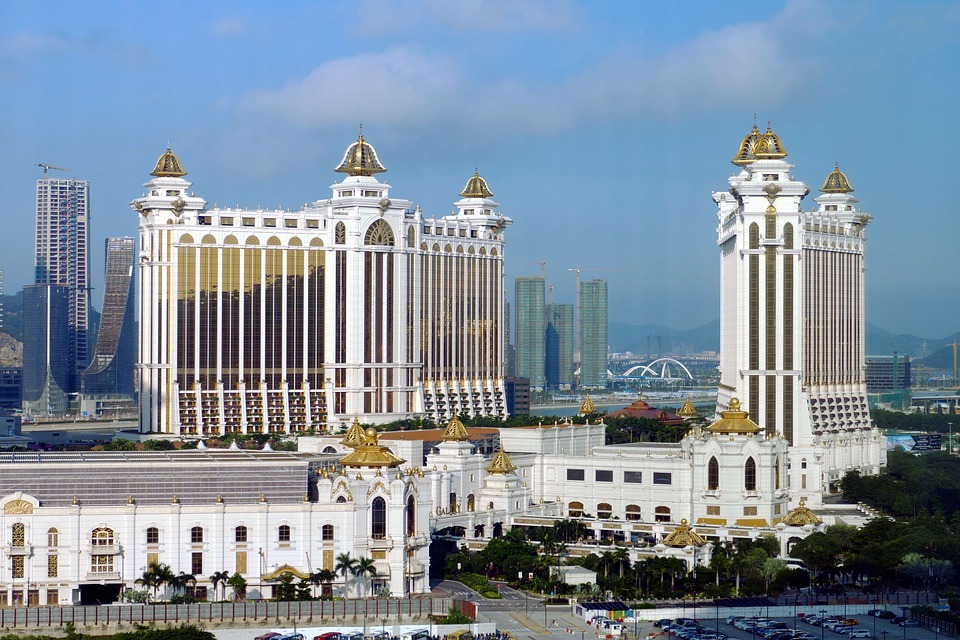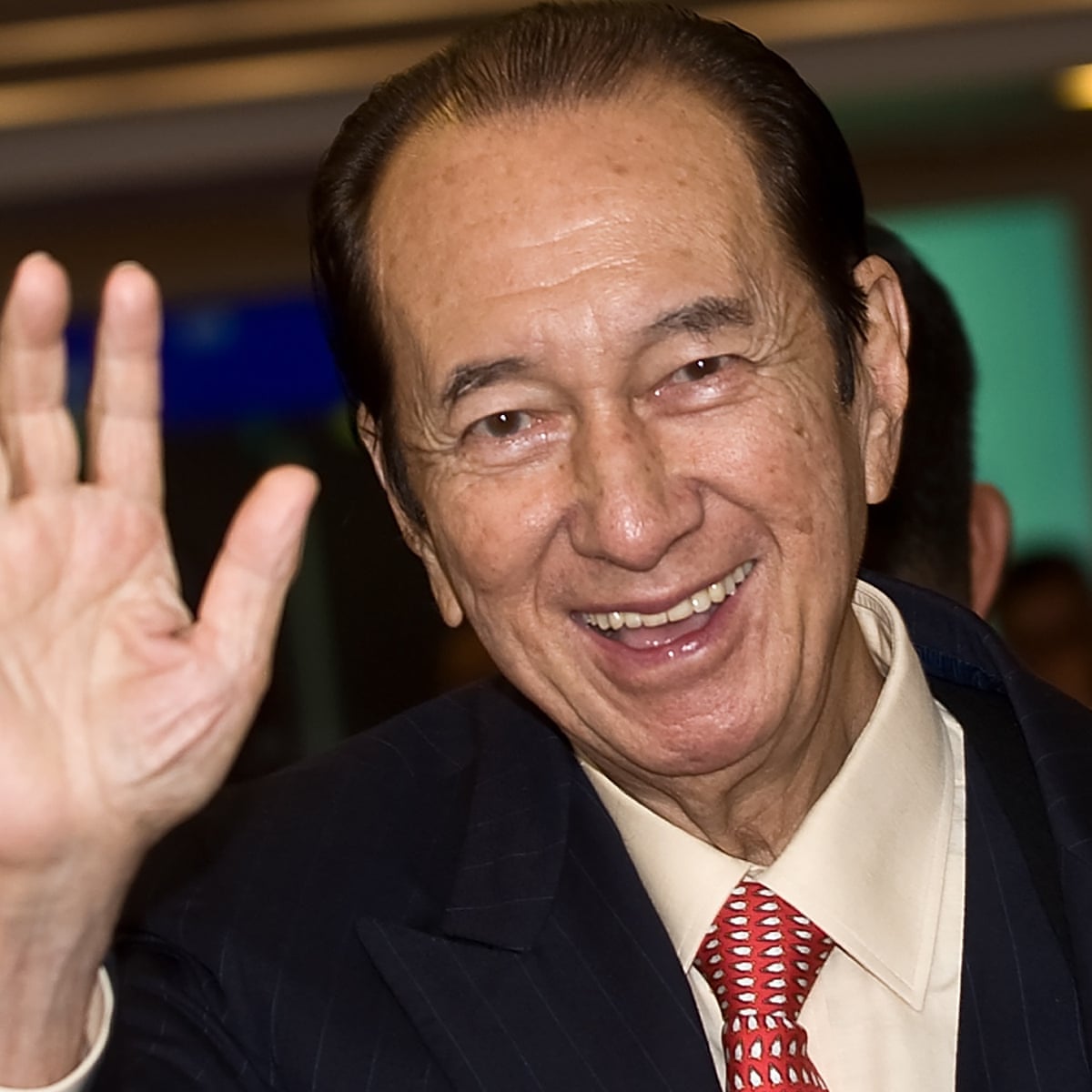Macau Casino History
| Grand Lisboa 新葡京酒店 | |
|---|---|
Location within Macau | |
| General information | |
| Location | Sé, Macau, China |
| Coordinates | 22°11′26.4″N113°32′35.1″E / 22.190667°N 113.543083°E |
| Opening | December 2008 |
| Height | 261 m (856 ft) |
| Technical details | |
| Floor count | 52 |
| Design and construction | |
| Architect | Dennis Lau & Ng Chun Man Architects & Engineers (HK) Ltd. |
Grand Lisboa (Chinese: 新葡京) is a 47-floor,[1] 261-metre-tall (856 ft) hotel in Sé, Macau, China. It is owned by Sociedade de Turismo e Diversões de Macau and designed by Hong Kong architects Dennis Lau and Ng Chun Man. Its casino and restaurants were opened on February 11, 2007, while the hotel was opened in December 2008. The casino offers 800 gaming tables and 1,000 slot machines. The hotel contains 430 hotel rooms and suites. The Grand Lisboa is the tallest building in Macau and the most distinctive part of its skyline.
Gambling was legalized in Macau in the 1850's. In 1962 Stanley Ho gained a monopoly on gambling in Macau through his company STDM, Sociedade de Turismo e Diverses de Macau, or in English, Macau Tourism and Amusement Company. The sub-company of STDM that manages the casinos is SJM, Sociedade de Jogos de Macau, or the gaming company of Macau. The casino: The Venetian isn't just the biggest casino in Macau - it has the world's largest casino floor. Within its 376,000 square feet of gaming space are 640 gaming tables (baccarat, sands.
The casino is the first in Macau to offer Texas hold 'em poker ring games. It was also the first to offer craps, though several other casinos in Macau now offer the game.
In 2017 it was reported that the Grand Lisboa suffered a decline in revenue and profits during 2016.[2]

Features[edit]
Venues[edit]
Joël Robuchon joined the group in 2007 as the owner of the hotel restaurant, Robuchon au Dome, which in 2008 was awarded three stars by the Michelin Guide when it was known as 'Robuchon a Galera.' The restaurant was renamed when it moved locations inside the hotel. The wine list features over 14,600 wines and has won the Wine Spectator “Grand Award”. In January 2013, the Miele Guide named Robuchon Au Dome as the top restaurant in Asia.[3] It is ranked number 6 in the world by Elite Traveler in 2016 and 2017.[4]
Art and attractions[edit]
The Star of Stanley Ho is on permanent display at the Casino Grand Lisboa. According to the Gemological Institute of America, the 218.08 carats (43.616 g) diamond is the largest cushion shaped internally flawless D-color diamond in the world.[5]
Gallery[edit]
Casino Lisboa
Interior
From street level
From Fortaleza do Monte
Detail
Detail of windows
See also[edit]
References[edit]
- ^'Grand Lisboa'. Emporis.
- ^'GGRAsia – SJM Holdings posts 5.6 pct fall in 2016 net profit'. www.ggrasia.com. Retrieved 2017-03-07.
- ^'Robuchon Au Dome in Macau named best restaurant in Miele Guide to Asia'. news.com.au. 24 January 2013.
- ^'ROBUCHON AU DÔME'. Elite Traveler. 5 May 2017.
- ^Episode 8: Macau’s Ace of Diamonds Destination MacauArchived 2008-07-26 at the Wayback Machine
External links[edit]
| Wikimedia Commons has media related to Grand Lisboa. |
Coordinates: 22°11′26.4″N113°32′35.1″E / 22.190667°N 113.543083°E

Macau is China’s answer to Las Vegas. But the former Portuguese colony has long surpassed the City of Lights as the world’s casino capital, with revenue from gambling receipts exceeding the entire state of Nevada back in 2010. As well as drawing in the punters, it has the glittering architecture to match.
The story of Macau is one of globalisation and the rise of China. It is a globalisation story because of the role played by foreign multinational casino companies. And it is a story of the rise of China because it has been the economic prosperity of its citizens that has allowed them in great numbers to travel, see the world, and gamble.
Macau returned to Chinese rule in 1999 as a special administrative region, which means it has different laws to the mainland. It is the only part of Greater China (which includes China, Hong Kong and Macau) where gambling is legal, making it the country’s sole gambling destination.
In the years before the 1999 handover, the environment in Macau was fraught, with organised crime a violent presence competing for access to the sub-contracted VIP gaming rooms. These VIP rooms, which host high stake games in a private setting, are another dynamic behind Macau’s success. They made the Macau gambling experience different from that of other casino destinations.

Macau’s focus on high-spending customers, with private rooms and special privileges – rather than mass market gamblers – is the source of much of the casinos’ revenue. Casinos were originally built around VIP rooms. These were sub-contracted to gambling promoters who shared in the profits from bringing in wealthy gamblers. These high rollers made up 66% of total casino revenues in 2013.
International investment
Casino operations generate substantial tax revenue for the government: in 2001 it was 40% of all tax revenue collected. Ten years later, government income from casino gaming taxes amounted to 81% of all tax revenue collected. This massive change is the result of the decision to open up the casino industry and invite foreign firms to compete for a casino license.

Until 2001, only one company was licensed to operate casinos and for four decades this was monopolised by a company called Sociedade de Turismo e Diversões de Macau, SA (STDM). From 2002, casino licences were awarded to several foreign multinational firms and joint ventures. This included big firms from Australia, Hong Kong and the US, with recognisable names from Vegas, such as Las Vegas Sands, MGM, Galaxy and Wynn Resorts.
They invested heavily in big new casino resort complexes, with luxury hotels and high-end shopping malls. Given Macau’s tiny size – it originally consisted of a mainland peninsula and two small islands measuring 11.6 square kilometres in 1912 – land reclamation projects were necessary to host the burgeoning industry. By 2010, the territory measured 29.7 square kilometres, including six square kilometres of new land connecting the small islands of Coloane to Taipa, which plays host to the big casino complexes.
These new casinos have provided some employment opportunities for local citizens, but the greater impact for the economy has been the tourist visitor numbers and the tax revenue generated. After a decade of ever-increasing growth in gaming revenue with the opening of new casinos, tax revenue from the sector peaked in 2014 and then declined after China’s president, Xi Jinping instituted a widespread anti-corruption campaign.
The VIP gaming rooms in Macau became seen by the government in Beijing as a massive leakage of capital from the Chinese economy. A large part of the big money being gambled by these VIPs was seen as the proceeds of corruption and bribery on the mainland.
In 2014, gaming tax revenue provided 84% of the Macau government’s total revenue; by 2017 it had declined to 79%. But these percentages conceal the decline in the actual amount available to the government, from US$20.1 billion in 2014 to US$15.7 billion in 2017. This is because a number of Chinese elites eschewed Macau’s casinos to avoid scrutiny during Xi’s corruption crackdown.
Casino revenue now appears to have stabilised, helped by a move in Macau away from relying on the VIP sector and towards mass market entertainment. The government has also encouraged diversification beyond the casino gaming room and, like Las Vegas, it is looking to attract exhibitions and events to be held there.
The new bridge connecting Macau with Hong Kong should support increasing tourist visits by easing travel to the territory, further supporting diversification. But Macau must increasingly contend with neighbouring rivals. The anti-corruption campaign encouraged Chinese gamblers to visit other Asian casino destinations, including new resorts in Singapore and Manila in the Philippines.

Macau Casino Owner
Modern Macau is built on China’s rise and the increased wealth of its citizens that this has brought. Macau’s continued success is contingent on its ability to attract the mass market gambler, along with other tourists, as a vacation destination. As China’s middle class continues to grow, it should guarantee a steady supply for years to come.